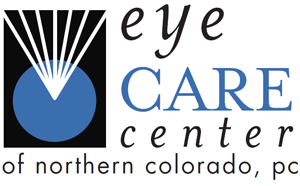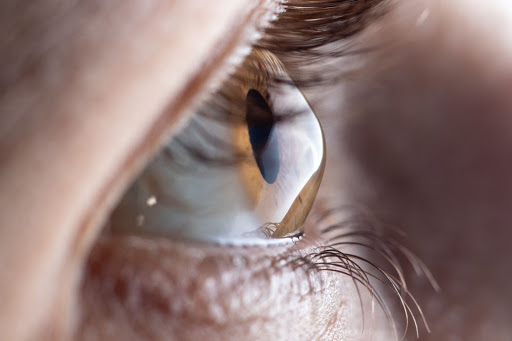Issues with your corneas are best trusted to eye doctors with extensive experience. Thankfully, the Eye Care Center of Northern Colorado is one of the most advanced facilities for eye health, vision correction, and refractive surgery in the area; and we have invested in the latest eye care technologies to bring you state-of-the-art eye surgery procedures.
Understanding corneal disorders allows you to understand eye health and stay aware of potential issues. At the Eye Care Center of Northern Colorado, not only do we provide traditional solutions for existing or chronic corneal problems, but our patients experience innovative corneal care and treatments with less-invasive solutions that increase safety, or end-stage solutions when traditional treatments have failed.
Keratoconus
Keratoconus is an uncommon condition that causes a progressive thinning and bulging of the clear front portion of the eye, called the cornea. As this condition progresses, the cornea develops a cone-like bulge that alters the shape and distorts vision. Keratoconus usually affects both eyes, but the progression and symptoms may differ in each eye. Blindness rarely occurs as a result of keratoconus although vision may become significantly impaired. The cause of keratoconus is unknown but some researchers believe there may be a genetic link because an estimated 10% of patients with keratoconus have a family member with the disease.
In general, glasses are used to correct vision in keratoconic patients. Rigid gas permeable contact lenses (RGP) may be used if good vision cannot be achieved with glasses. RGP are contoured to address the cone-like shape of the cornea, which improves vision. A proper-fitting lens is vital in providing a comfortable fit and adequate vision.
A relatively new option for keratoconic patients is placing crescent-shaped acrylic inserts (Intacs) in the midperiphery of the cornea. This has shown to be an effective treatment for some.
An additional option is called Corneal Cross-linking. In this procedure, doctors use eyedrop medication and ultraviolet (UV) light from a special machine to make the tissues in your cornea stronger. The goal is to keep the cornea from bulging more. It’s called “cross-linking” because it adds bonds between the collagen fibers in your eye. They work like support beams to help the cornea stay stable.
Corneal cross-linking is the only treatment that can stop progressive keratoconus from getting worse. And it may help you avoid a corneal transplant, which is an end point for some.
Pterygium
Pterygium (sometimes called surfer’s eye) is a pinkish, triangular tissue growth on the cornea of the eye. It typically starts on the cornea near the nose. It may grow slowly, but rarely grows so large that the pupil is covered. Pterygia that are threatening the visual axis, causing significant astigmatism or irritation should be excised.
Our modern methods of pterygium surgery greatly reduce the incidence of recurrence and have a better cosmetic outcome. Dr. Aimee Verner, M.D. is a national speaker and advocate for the use of amniotic membrane in ocular surface reconstruction. This method includes primary excision, polishing of the corneal bed, and precise application of an amniotic membrane transplant (AMT) graft in the bed of the former pterygium. While reports vary, such a method generally reduces the risk of recurrence from 50%, with just primary excision, down below 5%, and usually reduces post-operative pain as well.
Dry Eye Disease
A chronic lack of sufficient moisture on the surface of the eye causes dry eye disease (or dry eye syndrome). Consequences of dry eyes range from subtle, constant eye irritation to significant inflammation and even scarring of the front surface of the eye.
Many people have tried multiple treatments with little success and may have been suffering with symptoms for years. Our clinic is one of the few that can measure tear quality as well as production to help determine the best treatment plan for each individual case.
Treatments can be something as simple as eye drops and warm compresses or even going to a prescription eye drop. However, there are times when a more complex kind of treatment is called for, such as the cleaning of the eyelid meibomian glands using the LipiFlow procedure or an Intense Pulsed Light (IPL) treatment to the orbital area to improve tear production. Other treatment options include eyelid procedures like permanent punctal occlusion, permanent and temporary lateral tarsorrhaphy, and lid tightening for loose eyelid adherence (Floppy Eyelid Syndrome).
External & Infectious Eye Disease
The outside of the eye has direct contact with the environment, so it’s susceptible to infections and injuries. There are also a number of hereditary diseases that can impact the outer eye. Major signs of external eye disease include redness that doesn’t improve with treatment and poor vision that’s not caused by retina problems.
Patients with significant recurrent or chronic ocular surface problems present a diagnostic challenge. We welcome these challenges and can run full evaluations and tests to get to the bottom of these cases and determine their systemic causes. Recently diagnosed cases include:
- Acanthamoeba keratitis
- Thygeson’s superficial punctate keratitis (TSPK)
- Nodular scleritis due to undiagnosed Polyarteritis Nodosa
- Dry eye due to Wegner’s granulomatosis
- Dacryocystocele with preseptal cellulitis
- Ocular cicatricial pemphigoid and ankyloblepharon
- Corneal and conjunctival neoplasms
- Bacterial corneal ulcers
- Fungal corneal ulcers
- Viral corneal disease
We take on infectious disease cases on an emergency basis. We will send cultures, microscopic, serological and tissue tests as indicated and manage fortified topical or injected ocular medications and systemic medications as needed in these cases.
Have Corneal Concerns?
At the Eye Care Center of Northern Colorado we offer the best specialized eye care for your cornea and laser vision correction needs. Make an appointment today to meet with one of our specialists to help! We have convenient offices in Boulder, Longmont, Lafayette and Greeley for all of your vision-related concerns and needs. To schedule an appointment, please call 303-772-3300.

